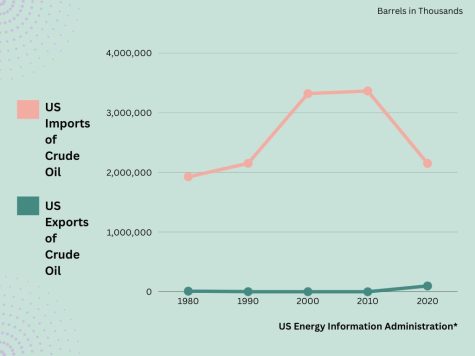Money Moves
April 14, 2023
The significance of oil drilling for the U.S. lies in an economic idea referred to as “self-sufficiency,” the ability of a country to be sufficient enough with its own natural resources and goods without any dependence on other countries for their economic stability. In the context of the Willow Project, the U.S. faces an increased dependency on foreign oil, a crucial resource in daily life.
As our country faces a depletion of crude oil resources, especially amidst the current state of the Russia-Ukraine conflict, politicians and representatives feel pushed to swing the economy upward before it drops further. The Willow Project aims to extract 600 million barrels of oil from Alaskan grounds, an impressive counter compared to the 8 million barrels of oil that the U.S. imports daily from across 73 countries. Amidst the project’s acceptance is the underlying political impression of a self-sufficient economy. The adoption of national oil reserves as a prominent fuel provider causes a reduction of oil importation dependency, shifting a sense of energetic burden from foreign oil companies to national oil companies.

The efficiency of crude oil and gasoline for motor vehicles makes petroleum highly valuable and in turn, a method of the economic rationale for the approval of the environmentally damaging Willow Project. Environmental science teacher Paul Hage recognizes the national economic significance of the finite resource of oil despite the environmental side of the debate.
“Viewing [the Willow Project] through an economic lens, oil is a finite, non-renewable resource. Our reserves are low, and as we move forward and continue to use up our petroleum, we’re going to be forced to find it in more extreme places,” Hage said.
Additionally, the results of accepting this oil drilling plan will benefit the country’s general population after the recent surge of consumer prices due to inflation. In particular, regular gasoline prices rose over 49% simply within the year 2022. The Willow Project offers a solution — without the need to import oil from foreign countries, avoiding excessive taxes and fees for international transport, gasoline prices have a chance of reducing significantly. The importance of this resonates with families across the U.S., particularly low-income families hit hard by recent stages of inflation, as a relief to the ever-growing budget of transportation in the modern day.
Many Alaskans also argue that the new oil drilling project will provide a much-needed source of revenue for the state of Alaska through the production of billions of dollars of economic activity and tax revenue for the flagging economy. Consequently, a number of Alaskans favor the idea of its opportunity to open up jobs for Alaskans and grow the state’s labor force. For these reasons, various Alaskan representatives in the bipartisan congressional delegation have supported the Willow Project, along with certain groups of Alaskan natives on the North slope, pledging the importance of this new source of revenue for Alaska’s economy in aiding education and health care.
However, the U.S. is one of the most self-reliant countries in the world already, a title that has played a significant role in the recent age of politics in the U.S. Because of this, the significance of the Willow Project’s economic opportunity doesn’t quite compare in the grand scheme of the U.S. economy. Ultimately, compared to the 8 million barrels a day being imported, the 600 million barrels earned from the Willow Project would last only 75 days without any additional imports. In reality, the U.S. economy can not avoid importing oil solely because of this project.
Additionally, as inflation prices have begun to swoop back up, the Willow Project’s economic rationale may not remain so important to low-income families. The various economic benefits that supporters of the Willow Project offer are only surface-level ideas and reflect a narrow-minded approach to the root cause of economic dependency and inflation.
